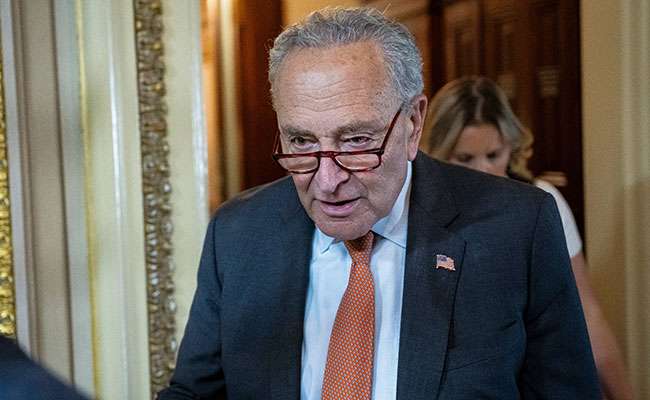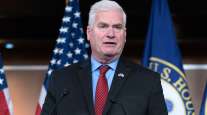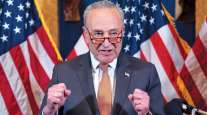Senior Reporter
Fiscal 2025 Bills on Congress’ Fall Calendar

[Stay on top of transportation news: Get TTNews in your inbox.]
When senators return to Washington from the August recess, passing fiscal 2025 legislation will headline the chamber’s agenda, Majority Leader Chuck Schumer said before adjourning for the summer.
Lawmakers anticipate a partisan clash this fall since House and Senate appropriations funding measures differ on spending levels as well as policy instructions.
“It’s going to take bipartisanship to avert a shutdown, as it always does,” Schumer (D-N.Y.) said Aug. 1. “In the Senate we’re working on bipartisan bills. I think they passed three or four more bills today in the Senate [Appropriations] Committee — Democrat and Republican — Chair [Patty] Murray, ranking member [Sen. Susan] Collins working together.”
The Senate leader added, “Contrast that to the House, where they can’t pass anything bipartisan. They can’t even pass some of the bills with partisan majorities, and it’s filled with poison [policy] pills. So we’re going to have to work hard. But I’m confident if Speaker [Mike] Johnson learns the lessons of the past few times and works in a bipartisan way, we can avoid a shutdown.”

Sens. Patty Murray (D-Wash.), left, Susan Collins (R-Maine)
Congress will have nearly three weeks to clear for the White House spending bills for the upcoming fiscal year to avert a partial shutdown. Funding authority for federal agencies expires Oct. 1. Last month, the appropriations panel easily advanced the Transportation Department fiscal 2025 funding bill.
Murray (D-Wash.) argued it “makes critical new investments to help people keep a roof over their head and safely get to where they need to be — with new funding to hire more air traffic controllers and air and rail safety inspectors, boost our housing supply, sustain rental assistance, [and] improve America’s roads and bridges.”
Dollar Distribution
Proposed funding for U.S. Department of Transportation agencies in the fiscal 2025 bill:
- Federal Motor Carrier Safety Administration: $964.5 million
- Federal Highway Administration: $63.1 billion
- Federal Aviation Administration: $22 billion
- Federal Transit Administration: $17 billion
- Federal Railroad Administration: $3.4 billion
- National Highway Traffic Safety Administration: $1.2 billion
As for policy directives specific to trucking, the legislation would block enforcement of electronic logging devices for carriers transporting livestock or insects. The bill would prohibit inward-facing cameras as part of a commercial driver apprenticeship, and it would urge FMCSA to assist in a review of guidelines meant to safeguard against predatory towing.
Per autonomous trucks, the measure assigns FMCSA a review of existing research about safety warning device systems or signs. And the bill calls for a comprehensive report on cargo theft trends identified in the commercial transportation supply chain.
“It is critical that we prioritize significant investments to improve our nation’s airports, roads, bridges and ports as well as increase the supply of safe, affordable housing for communities throughout the country,” added Collins (R-Maine) about the bill, which also would fund programs at the Department of Housing and Urban Development. On the other side of the Capitol, the Republican-led House has yet to schedule a floor vote on its committee-passed version.

Vance
Regarding freight rail policy, Schumer emphasized his caucus is pushing for passage of the Commerce Committee-passed Railway Safety Act. However, broad bipartisan support has yet to be demonstrated by the bill’s co-lead sponsor, Sen. J.D. Vance (R-Ohio). The first-term senator is former President Donald Trump’s re-election running mate.
“I asked J.D. Vance about four times … to give me 10 names of Republicans — and we need a few more than 10 if we have an absence here or there — but to give me 10 names of Republicans who would vote for the bill. He couldn’t,” said Schumer, referring to the chamber’s 60-vote threshold for passing bills.
Jeff Loftus of FMCSA joins TT’s Seth Clevenger to discuss the current outlook on ADAS technology and how it will affect the industry at large. Tune in above or by going to RoadSigns.ttnews.com.
“It’s a bill we want to pass. It’s a good bill. And if he can show us that there are 10 votes — now maybe that he’s [the] vice president [nominee] that’s changed — we’ll get the bill done,” he said. “Show us the 10 votes, and we’ll get it done.”
Despite lacking significant backing from Senate Republicans, Vance has continued to champion his bill.
“The derailment and subsequent chemical explosion were preventable tragedies resulting from a series of errors made by Norfolk Southern and its contractors,” he said.
This summer, the National Transportation Safety Board determined a Norfolk Southern railcar’s defective wheel bearing caused the Feb. 3, 2023, derailment in East Palestine, Ohio. House Republicans unveiled comprehensive freight rail legislation shortly after NTSB’s findings.
Sponsored by Troy Nehls (R-Texas) and Seth Moulton (D-Mass.), the Railroad Safety Enhancement Act of 2024 awaits a vote in committee.

Nehls
“This bipartisan legislation will help modernize our nation’s rail network and invest in crucial programs that will enhance our rail network’s safety,” Nehls said July 23. “I applaud my Republican Senate colleague, Republican vice presidential nominee Sen. J.D. Vance, for introducing the Railway Safety Act of 2023, which is a core component of this legislation.”
Senate Commerce Committee Chairwoman Maria Cantwell (D-Wash.), instrumental in working with Vance to advance their legislation, applauded the House version.
“The NTSB’s findings make clear that the East Palestine derailment could have been prevented. The Railway Safety Act requires technologies to detect problems before they cause a derailment, adds safeguards for trains transporting flammable gas, increases penalties for safety violations and gives communities more resources to prepare for derailments,” the chairwoman said last month. “Congress needs to act on rail safety.”
Want more news? Listen to today's daily briefing below or go here for more info:





